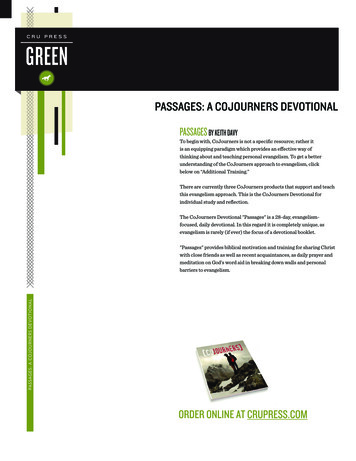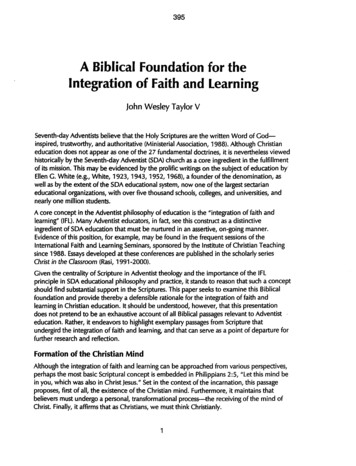
Transcription
1THEFAI T H-D R I V E NL E AD E RD E VO T I O NALA Reflection on Personal Mission Integration
2INTRODUCTIONIf you’re reading this, the term “mission integration” likely conjures up some thoughtsand feelings in your head. What it should look like, how it should be implemented,whether or not it’s being done well -- all of these things swirling around in your mind.As faith-based organizations like hospitals and nonprofits move forward in today’slandscape, the leaders at those companies are becoming increasingly concerned withmission integration and how to incorporate it well. On one hand, that’s a great thing.Being more intentional about putting tangible missional elements in place is crucialto having any sort of mission component be successful. However, when “missionintegration” becomes somewhat of a buzzword, it can breed a sense of complacencyor make the initiatives seem like another list of to-dos in operating an organization.Mission integration is not just a job title or even simply a key results area. It’s a way ofdoing things both personally and professionally, for leaders and their organizations.If, as a leader, you are championing certain values for the organization, they shouldalso apply to you personally.This devotional is intended to be a two-week focused reflection on how you as aleader in a faith-based organization reflect the not only the missional values of yourorganization but the Gospel of Christ in our day-to-day lives. It’s time all membersof the organization — but primarily the leadership — internalize these values anddisplay them in how they work on a daily basis. It’s not just one person’s job to makesure missional components are being exemplified by the company. It’s yours -- andyou have the unique ability to influence others by example.As you spend time in this devotional, consider practical ways you can implement yourcore values in the day-to-day, whether that means interacting with your staff, makingdecisions for the organization or navigating your personal life. Whatever we do, we doto the glory of God.
3Ou r L iv es Are NotO u r O wnMark 8:34-37And calling the crowd to him with his disciples,he said to them, “If anyone would come after me,let him deny himself and take up his cross andfollow me. 35 For whoever would save his life willlose it, but whoever loses his life for my sake andthe gospel’s will save it. 36 For what does it profit aman to gain the whole world and forfeit his soul?37For what can a man give in return for his soul?(ESV)
4As our busy lives roll from one day to thenext, packed to the brim with work, familyand all manner of to-dos, it’s easy to becomeHow does keeping thisentrenched in the belief that it all revolvesin perspective helparound us. That not only is our life centeredyou navigate your dayaround our own happiness, but it depends onus to keep moving. We find ourselves drivenin a way that is moreby self-interest and our own schedule, whetherrepresentative ofwe are conscious of it or not. Or, perhaps moreChrist?common for those in faith-based work, we areconsumed by trying to get everything done forthe ultimate goal of serving others. God’s Wordsays we are to die to ourselves — namely, ourself-interest — every day. As believers, ourlives are no longer our own. Scripture says wehave been bought with a price — the cost ofJesus’ death. We are but a microscopic piecein the grand scheme of God’s story. But hecares about us individually because we areHis. Remembering that our lives are not ourown will serve us well in our careers, as well asbring us peace, knowing that no achievementor zeroed-out inbox will ever do what Jesus hasalready done for us, and that those things palein comparison to His glory. Armed with thistruth, we press onward to the calling He’s givenus, understanding that our day-to-day is not allabout us — or even all about our organization— but all about Him. Take some time toreflect on this idea today and how it can applyto you personally as you lead others in yourorganization.
5A Living SacrificeRomans 12:1I appeal to you therefore, brothers, by the merciesof God, to present your bodies as a living sacrifice,holy and acceptable to God, which is yourspiritual worship.(ESV)
6In the Old Testament, animal sacrificeswere offered to temporarily salve the Lord’swrath — a wrath we undeniably deservedas retribution for our sin. Since Adam andIn what way can youEve, man had been breaking God’s lawoffer your life as aconstantly, and because God is just, herequires payment for that sin. Enter thesacrifices. Of course, the blood of a lambseems small in comparison to breaking thelaw of the all-creating God. And it was. Buteven then, God was preparing the worldfor a day when the Ultimate Sacrifice —His son — would come to die in our place,eliminating the need for us to sacrifice inthe way of the Old Testament to pleaseGod. Now that we are saved by the grace ofGod’s unconditional love for us, throughJesus, we are to offer our bodies as livingsacrifices. This means to dedicate our everyday life to Him. Our salvation can never belost, but as followers of Christ, we are nowcalled to live open-handedly, knowing thatnothing is truly our own. We are to offerevery part of us as a way to glorify Him andnot ourselves. Perhaps this looks differentdepending on what the day brings: prayingfor discernment in decision-making orgrace in dealing with a difficult conflict. Butreminding yourself that everything you dois to be a sacrifice to the One to whom weowe everything not only takes the pressureoff us to make much of ourselves but keepslife in perspective.sacrifice to God today?
7Eternal, notTemporary2 Corinthians 4:18 For the things that are seen are transient, but thethings that are unseen are eternal.(ESV)
8Though the work we do here on earthmatters, this world is not our home. Asbelievers we trust that though we live inThink about a fewa fallen world, we will one day get to livethings that have beenwith Jesus eternally in Heaven. The thingscausing you worry orof this world will eventually all fall away.stress lately. Are theyInternalizing this means we fix our eyes onthe things that last — the eternal — not thetemporary or eternal?things that are fading away. We make ourIf they are temporary,investments in the spiritual, not the physicalas so many things are,— in people’s souls, not things. Professionalconsider how yourachievements, a busy schedule, even theorganization itself will all fade eventually,feelings and responsebut if we prioritize the things that remainmight change.— loving others, serving Christ and being inrelationship with Him — our lives will not bein vain. While professional and personal goalsare certainly worthwhile and good, living outthe Gospel and helping point others towardChrist, who is the only way to eternal life, isthe only investment that will truly outlive us.Remembering we are a small part of a muchbigger story helps us take a step back and seeour responsibility and privilege as believersand also relieves the stress of many perceivedproblems in our day-to-day lives, simply byshifting perspectives. Keeping this eternalviewpoint helps bring a sense of peace to ourlives, knowing that so many things we worryabout on a daily basis are, in fact, temporary.It allows to us steward well the resources Godblesses us with, but not get so caught up in thedetails we overlook our true calling.
9Compassion for thePoorMatthew 25:35-40‘For I was hungry and you gave me food, I wasthirsty and you gave me drink, I was a strangerand you welcomed me, 36 I was naked and youclothed me, I was sick and you visited me, I was inprison and you came to me.’ 37 Then the righteouswill answer him, saying, ‘Lord, when did we seeyou hungry and feed you, or thirsty and give youdrink? 38 And when did we see you a stranger andwelcome you, or naked and clothe you? 39 Andwhen did we see you sick or in prison and visityou?’ 40 And the King will answer them, ‘Truly, Isay to you, as you did it to one of the least of thesemy brothers, you did it to me.’(ESV)
10Having compassion for those in needseems like a given. Nearly everyone caresabout the fact that many people go hungryWhat’s one way youevery day or lack basic necessities. But inand your team couldpractice, how do we cultivate compassioncultivate compassionfor those people day in and day out? Manyfor those in need today?organizations list compassion for those inneed as one of their core values, but how dowe, as individuals, internalize this value inour personal and professional day-to-day? Itdoesn’t always mean giving money, thoughthat is, of course, helpful. Sometimes itmeans choosing to look someone in theeye and see them as a real person, God’screation. Sometimes it looks like starting aninitiative to solve an issue in the communityor simply getting to know someone in adifferent walk of life than you. Listeningto their story, talking less. Partnering withpeople already doing great work. Cultivatingcompassion for the poor in our own livesis something we are called to as Christians,but we should also make a part of our dayto-day as leaders and encourage otherstowards.
11Rev erence for AllGenesis 2:27So God created man in his own image, in theimage of God he created him; male and female hecreated them.(ESV)
12The Bible says all people are made inthe image of God. What an honor and aprivilege to carry his likeness! As GenesisThink about a person instates, we were created at his hands, andyour life to whom it mayby our very being, we are His. When weseem difficult to showremember this — when we try to see Godcompassion or love —in every person with whom we interact— we are able to have a greater sense ofa coworker, a client, arespect and care for them as individuals.patient — whoever itGod asks us through His word to work inmay be. How does itharmony with one another and show lovechange your postureto everyone, even when it’s difficult. Infact, Jesus even takes God’s command totoward them knowinglove one another a step further in the Newthey, like you, are madeTestament, calling us to love not just ourin the image of God?neighbor, but our enemies as well. For anorganization, recognizing each person’svalue as God’s creation may look likeserving everyone with excellence or caringfor each person uniquely. For a leader,though, this could mean an internal egocheck or trying to see someone’s differingpoint of view more clearly. Rememberingthat we are all God’s children and bear Hislikeness should inform how we treat othersin our day-to-day lives, regardless of howothers respond to us.
13Spiritual CareEphesians 4:29,32Let no corrupting talk come out of your mouths,but only such as is good for building up, as fits theoccasion, that it may give grace to those who hear 32Be kind to one another, tenderhearted, forgivingone another, as God in Christ forgave you.(ESV)
14While a mission goal of ‘spiritual care’ mayspecifically relate to organizations, theconcept can be applied to us as individualsWhatever scenariosas well. As Christians, we are called to walkare present in your life,alongside one another in community,how might you respondweeping with those who weep and buildingin light of the callingone another up. The heart of thosedirectives is essentially the same as the onebehind ‘spiritual care.’ It can be especiallytempting in a work environment to placeblame or even gossip, but as followers ofChrist we must hold ourselves to a higherstandard, letting “no corrupting talk”come out of our mouths and encouragingone another. We know, however, that weare not perfect and that we will say or doprideful, hurtful or simply unkind things.The important thing is that we continue onto verse 32 - forgive one another as God inChrist forgave us. We ask for forgivenessand forgive others, stumbling through thisimperfect life as Christians here on earthtogether. Reflect on the people you interactwith every day. Is there someone you couldcome alongside as they weep, or evenrejoice? Perhaps you feel God convictingyou regarding something you’ve said ordone that needs forgiveness. Perhaps you’vethought of someone who could use someencouragement.we have to build oneanother up?
15IntegrityEphesians 4:25Therefore, having put away falsehood, let eachone of you speak the truth with his neighbor, forwe are members one of another.(ESV)
16One standard to which all believers areheld is integrity, whether or not we are aleader of a faith-based organization. ThoseThink about a timearound us — especially nonbelievers —when you were temptedshould be able to to trust in our word andto curb your integrity.that we will do what we say we are goingHow did you react?to do. Mistakes and shortcomings areinevitable, but being upfront in handlingWhat would you dothem is the difference between integritythe same or differentlyand deceitfulness. As Christians we shouldtoday in light of thesenever sacrifice truthfulness for personal orverses?professional gain, nor should we abandonhonesty to save face. We are to be the samein the dark as in the light, speaking the truthin love as we walk alongside one another.It is often tempting to massage the truth orneglect to disclose information that mayseem unflattering toward ourselves, butin these scenarios we are called to assumehumility and remember that our lives arenot about us. By living with integrity we area testament to God, sacrificing self-interestfor His glory.
17Servant LeadershipMark 10:42-45And Jesus called them to him and said to them,“You know that those who are considered rulers ofthe Gentiles lord it over them, and their great onesexercise authority over them. 43 But it shall not beso among you. But whoever would be great amongyou must be your servant, 44 and whoever wouldbe first among you must be slave of all. 45 For eventhe Son of Man came not to be served but to serve,and to give his life as a ransom for many.”(ESV)
18When we consider the idea of servantleadership, what better example is therethan Jesus himself? Though Jesus was fullyReflect today on aGod, he humbled himself under God thechallenge you’re facingFather’s will. He also had every authorityas a leader. How mightto dictate to the people around Him whatChrist respond as athey should be doing and lord his powerover man. After all, He is the only personwho should do those things. But Hedoesn’t. He washes feet. He makes himselfnothing; ultimately sacrificing Himselffor us. He consistently pours out graceand patience, leading his disciples towardthe truth without forcing their hands. Asleaders, we should try to keep this attitudein mind when faced with challenges. Letcompassion, grace and humility lead yourresponses, not anger or pride. Considerhow Jesus led his disciples — the ultimateservant-leader.servant-leader?
19Do Everything withExcellenceColossians 3:23-24Whatever you do, work heartily, as for the Lordand not for men, 24 knowing that from the Lordyou will receive the inheritance as your reward.You are serving the Lord Christ.
20The concept of doing everything as untothe Lord may seem cliché or obvious whenleading a faith-based organization, butIn light of this, howit’s often easier said than done. While indoes your posturethe thick of it, we can often find ourselveschange toward youranxiety-ridden about what others mayto-do list today?think, or making decisions based out ofpride, even simply striving for approval. Butthis is not the spirit God gives us throughChrist. We are to work hard, yes, but to Hisglory and His alone. In this passage, Paul isreminding the Colossians of their identity inChrist, to not get caught up in the opinionsor expectations of man. As the Holy Spiritguides us, and calling upon the wisdom He’sgiven us, we take the next step, confidentin that which He’s commissioned us andremembering whose we are. And becausewe do all things for Him — our Creator,who always deserves our absolute best —we do our work to the best of our ability.Remember who you serve today.
21Influence OthersMatthew 5:14-16You are the light of the world. A city set on a hillcannot be hidden. 15 Nor do people light a lampand put it under a basket, but on a stand, and itgives light to all in the house. 16 In the same way,let your light shine before others, so that theymay see your good works and give glory to yourFather who is in heaven.(ESV)
22All believers are called to shine the light ofChrist to others, inspiring them to pursueand worship God — not because of anythingChoose one of the fruitswe do, but because we allow Christ toof the Spirit this weekdisplay Himself through us. As a leader, youto focus on and seeare in an even more unique position to sethow it affects your ownan example in faith. It doesn’t mean leadershave to be perfect or Super Christians,spirit as well as thosebut it does mean when Christian leadersaround you.make mistakes they are to confess and askforgiveness, approach others with humility,act with integrity and look to Christ as theultimate example of how one should lead. Ifthe Spirit is in us, we will bear fruit, and asScripture says, the fruit of the Spirit is love,joy, peace, patience, kindness, goodness,faithfulness, gentleness, and self-control.If we as leaders can allow the Spirit tomanifest these things our lives, we set anexample to others and inspire them topursue Christ also.
23FaithSearch Partners is the leading executive search firm in the nation focused exclusively onidentifying and recruiting leaders for all types of faith-based organizations including churches,parachurch organizations, as well as faith-based hospitals and healthcare systems.Based on a foundation of 28 years of experience from two major international retained executivesearch firms, FaithSearch Partners was established in early 2007 to serve faith-based healthcareorganizations and large, complex churches and ministries. In addition, the firm also respondsto clients which are not formally “faith-based” but still place a high value on leaders with strongspiritual values.FaithSearch consultants are adept at securing leaders whose personal commitment matchesthe needs, mission and culture of our faith-based clients. We focus on individuals whose skillset and track record demonstrates performance in all areas of importance to faith-basedorganizations: operational improvement, financial success, customer satisfaction and spiritualgrowth. Combined, consultants at FaithSearch Partners have successfully managed more than 450executive-level searches for numerous high-profile faith-based organizations across the country.
This devotional is intended to be a two-week focused reflection on how you as a leader in a faith-based organization reflect the not only the missional values of your organization but the Gospel of Christ in our day-to-day lives. It’s time all members of the organization — bu










